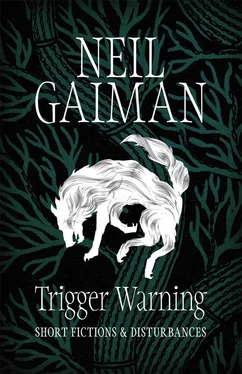Neil Gaiman - Trigger Warning - Short Fictions and Disturbances
Здесь есть возможность читать онлайн «Neil Gaiman - Trigger Warning - Short Fictions and Disturbances» весь текст электронной книги совершенно бесплатно (целиком полную версию без сокращений). В некоторых случаях можно слушать аудио, скачать через торрент в формате fb2 и присутствует краткое содержание. Год выпуска: 2015, Издательство: Headline, Жанр: Старинная литература, на английском языке. Описание произведения, (предисловие) а так же отзывы посетителей доступны на портале библиотеки ЛибКат.
- Название:Trigger Warning: Short Fictions and Disturbances
- Автор:
- Издательство:Headline
- Жанр:
- Год:2015
- ISBN:нет данных
- Рейтинг книги:4 / 5. Голосов: 1
-
Избранное:Добавить в избранное
- Отзывы:
-
Ваша оценка:
- 80
- 1
- 2
- 3
- 4
- 5
Trigger Warning: Short Fictions and Disturbances: краткое содержание, описание и аннотация
Предлагаем к чтению аннотацию, описание, краткое содержание или предисловие (зависит от того, что написал сам автор книги «Trigger Warning: Short Fictions and Disturbances»). Если вы не нашли необходимую информацию о книге — напишите в комментариях, мы постараемся отыскать её.
Trigger Warning: Short Fictions and Disturbances — читать онлайн бесплатно полную книгу (весь текст) целиком
Ниже представлен текст книги, разбитый по страницам. Система сохранения места последней прочитанной страницы, позволяет с удобством читать онлайн бесплатно книгу «Trigger Warning: Short Fictions and Disturbances», без необходимости каждый раз заново искать на чём Вы остановились. Поставьте закладку, и сможете в любой момент перейти на страницу, на которой закончили чтение.
Интервал:
Закладка:
I love you, I want you, I need you. I am yours just as you are mine. There. I have declared my love for you.
Soon, I hope, you will know this for yourself. And then we will never part. It will be time, in a moment, to turn around, put down the letter. I am with you, even now, in these old apartments with the Iranian carpets on the walls.
You have walked past me too many times.
No more.
I am here with you. I am here now.
When you put down this letter. When you turn and look across this old room, your eyes sweeping it with relief or with joy or even with terror . . .
Then I will move. Move, just a fraction. And, finally, you will see me.
Observing the Formalities
As you know, I wasn’t invited to the Christening. Get over it, you tell me.
But it’s the little formalities that keep the world turning.
My twelve sisters each had an invitation, engraved, and delivered
By a footman. I thought perhaps my footman had got lost.
Few invitations reach me here. People no longer leave visiting cards.
And even when they did I would tell them I was not at home,
Deploring the unmannerliness of these more recent generations.
They eat with their mouths open. They interrupt.
Manners are all, and the formalities. When we lose those
We have lost everything. Without them, we might as well be dead.
Dull, useless things. The young should be taught a trade, should hew or spin,
Should know their place and stick to it. Be seen, not heard. Be hushed.
My youngest sister invariably is late, and interrupts. I am myself a stickler for punctuality.
I told her, no good will come of being late. I told her,
Back when we were still speaking, when she was still listening. She laughed.
It could be argued that I should not have turned up uninvited
But people must be taught lessons. Without them, none of them will ever learn.
People are dreams and awkwardness and gawk. They prick their fingers
Bleed and snore and drool. Politeness is as quiet as a grave,
Unmoving, roses without thorns. Or white lilies. People have to learn.
Inevitably my sister turned up late. Punctuality is the politeness of princes,
That, and inviting all potential godmothers to a Christening.
They said they thought I was dead. Perhaps I am. I can no longer recall.
Still and all, it was necessary to observe the formalities.
I would have made her future so tidy and polite. Eighteen is old enough. More than enough.
After that life gets so messy. Loves and hearts are such untidy things.
Christenings are raucous times and loud, and rancorous,
As bad as weddings. Invitations go astray. We’d argue about precedence and gifts.
They would have invited me to the funeral.
The Sleeper and the Spindle
It was the closest kingdom to the queen’s, as the crow flies, but not even the crows flew it. The high mountain range that served as the border between the two kingdoms discouraged crows as much as it discouraged people, and it was considered unpassable.
More than one enterprising merchant, on each side of the mountains, had commissioned folk to hunt for the mountain pass that would, if it were there, have made a rich man or woman of anyone who controlled it. The silks of Dorimar could have been in Kanselaire in weeks, in months, not years. But there was no such pass to be found and so, although the two kingdoms shared a common border, nobody crossed from one kingdom to the next.
Even the dwarfs, who were tough, and hardy, and composed of magic as much as of flesh and blood, could not go over the mountain range.
This was not a problem for the dwarfs. They did not go over the mountain range. They went under it.
***
Three dwarfs, travelling as swiftly as one through the dark paths beneath the mountains:
‘Hurry! Hurry!’ said the dwarf in the rear. ‘We have to buy her the finest silken cloth in Dorimar. If we do not hurry, perhaps it will be sold, and we will be forced to buy her the second-finest cloth.’
‘We know! We know!’ said the dwarf in the front. ‘And we shall buy her a case to carry the cloth back in, so it will remain perfectly clean and untouched by dust.’
The dwarf in the middle said nothing. He was holding his stone tightly, not dropping it or losing it, and was concentrating on nothing else but this. The stone was a ruby, rough-hewn from the rock and the size of a hen’s egg. It would be worth a kingdom when cut and set, and would be easily exchanged for the finest silks of Dorimar.
It would not have occurred to the dwarfs to give the young queen anything they had dug themselves from beneath the earth. That would have been too easy, too routine. It’s the distance that makes a gift magical, so the dwarfs believed.
***
The queen woke early that morning.
‘A week from today,’ she said aloud. ‘A week from today, I shall be married.’
It seemed both unlikely and extremely final. She wondered how she would feel to be a married woman. It would be the end of her life, she decided, if life was a time of choices. In a week from now she would have no choices. She would reign over her people. She would have children. Perhaps she would die in childbirth, perhaps she would die as an old woman, or in battle. But the path to her death, heartbeat by heartbeat, would be inevitable.
She could hear the carpenters in the meadows beneath the castle, building the seats that would allow her people to watch her marry. Each hammer blow sounded like the dull pounding of a huge heart.
***
The three dwarfs scrambled out of a hole in the side of the riverbank, and clambered up into the meadow, one, two, three. They climbed to the top of a granite outcrop, stretched, kicked, jumped and stretched themselves once more. Then they sprinted north, towards the cluster of low buildings that made the village of Giff, and in particular to the village inn.
The innkeeper was their friend: they had brought him a bottle of Kanselaire wine – deep red, sweet and rich, and nothing like the sharp, pale wines of those parts – as they always did. He would feed them, and send them on their way, and advise them.
The innkeeper, chest as huge as his barrels, beard as bushy and as orange as a fox’s brush, was in the taproom. It was early in the morning, and on the dwarfs’ previous visits at that time of day the room had been empty, but now there must have been thirty people in that place, and not a one of them looked happy.
The dwarfs, who had expected to sidle into an empty taproom, found all eyes upon them.
‘Goodmaster Foxen,’ said the tallest dwarf to the innkeeper.
‘Lads,’ said the innkeeper, who thought that the dwarfs were boys, for all that they were four, perhaps five times his age, ‘I know you travel the mountain passes. We need to get out of here.’
‘What’s happening?’ said the smallest of the dwarfs.
‘Sleep!’ said the sot by the window.
‘Plague!’ said a finely dressed woman.
‘Doom!’ exclaimed a tinker, his saucepans rattling as he spoke. ‘Doom is coming!’
‘We travel to the capital,’ said the tallest dwarf, who was no bigger than a child, and had no beard. ‘Is there plague in the capital?’
‘It is not plague,’ said the sot by the window, whose beard was long and grey, and stained yellow with beer and wine. ‘It is sleep, I tell you.’
‘How can sleep be a plague?’ asked the smallest dwarf, who was also beardless.
‘A witch!’ said the sot.
‘A bad fairy,’ corrected a fat-faced man.
‘She was an enchantress, as I heard it,’ interposed the pot girl.
‘Whatever she was,’ said the sot, ‘she was not invited to a birthing celebration.’
Читать дальшеИнтервал:
Закладка:
Похожие книги на «Trigger Warning: Short Fictions and Disturbances»
Представляем Вашему вниманию похожие книги на «Trigger Warning: Short Fictions and Disturbances» списком для выбора. Мы отобрали схожую по названию и смыслу литературу в надежде предоставить читателям больше вариантов отыскать новые, интересные, ещё непрочитанные произведения.
Обсуждение, отзывы о книге «Trigger Warning: Short Fictions and Disturbances» и просто собственные мнения читателей. Оставьте ваши комментарии, напишите, что Вы думаете о произведении, его смысле или главных героях. Укажите что конкретно понравилось, а что нет, и почему Вы так считаете.







